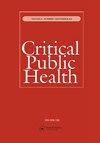新冠肺炎大流行期间,加拿大多伦多慈善社区食品计划的结构和机构交叉:培育系统性变革
IF 2.3
3区 医学
Q2 PUBLIC, ENVIRONMENTAL & OCCUPATIONAL HEALTH
引用次数: 3
摘要
摘要在2019冠状病毒病爆发之前,粮食不安全已经是加拿大一个严重的公共卫生问题,影响了12.7%的家庭。近年来,来自一系列健康相关学科的活动家、从业者和研究人员就食品银行和其他慈善食品计划的合法性进行了辩论,认为必须优先考虑联邦层面的政策和计划,以解决贫困的根本原因。本文对慈善食品计划阻碍或分散加拿大社会公平目标的说法提出了质疑。或者,本文认为,地方一级的计划和举措可以为当地社区带来短期稳定和自给自足,同时也倡导长期的结构性变革。根据反黑人种族主义的结构理论和批判生态学,我们考察了粮食主权倡议BlackFoodToronto的工作,以说明权力和代理的谈判,以及团体和网络如何通过合作实践对限制和扶持结构做出反应并重塑其。在应对加拿大的粮食安全危机时,本文提供了一个基于社区、非营利和慈善项目的替代视角,这些项目在实践中有助于为未来的粮食安全政策以及相关的健康公平和社区发展战略提供信息。本文章由计算机程序翻译,如有差异,请以英文原文为准。
The intersection of structure and agency within charitable community food programs in Toronto, Canada, during the COVID-19 pandemic: cultivating systemic change
ABSTRACT Prior to the COVID–19 outbreak, food insecurity was already a serious public health problem in Canada, impacting 12.7 percent of households. In recent years, activists, practitioners and researchers from a range of health–related disciplines, have debated the legitimacy of food banks and other charitable food programs, contending that policy and programs at the federal level must be prioritized to address the underlying root causes of poverty. This paper challenges the discourse that charitable food programs prevent or distract from Canada’s social equity goals. Alternatively, this paper argues that programs and initiatives at the local level can emerge to bring short–term stability and self–sufficiency to local communities while also advocating for longer–term structural change. Drawing upon structuration theory and critical ecologies of anti–Black racism, we examine the work of BlackFoodToronto, a food sovereignty initiative, to illustrate the negotiation of power and agency, and how groups and networks react to and reshape confining and enabling structures through collaborative practice. In addressing Canada’s food security crisis, this paper offers an alternative perspective of community–based, nonprofit and charitable programs, which in practice, can help inform future food security policy and related health equity and community development strategies.
求助全文
通过发布文献求助,成功后即可免费获取论文全文。
去求助
来源期刊

Critical Public Health
Multiple-
CiteScore
5.90
自引率
7.10%
发文量
36
期刊介绍:
Critical Public Health (CPH) is a respected peer-review journal for researchers and practitioners working in public health, health promotion and related fields. It brings together international scholarship to provide critical analyses of theory and practice, reviews of literature and explorations of new ways of working. The journal publishes high quality work that is open and critical in perspective and which reports on current research and debates in the field. CPH encourages an interdisciplinary focus and features innovative analyses. It is committed to exploring and debating issues of equity and social justice; in particular, issues of sexism, racism and other forms of oppression.
 求助内容:
求助内容: 应助结果提醒方式:
应助结果提醒方式:


